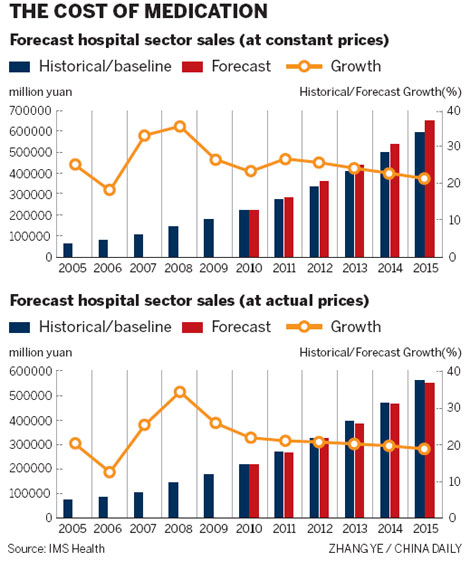Bitter medicine for sick people
Updated: 2011-12-19 07:54
By Liu Jie (China Daily)
|
|||||||||
Feng's company has hundreds of representatives like him and plans to double its sales staff in China within a few years, eyeing the nation's huge market potential. Speaking under condition of anonymity, a senior communications executive of a multinational drug enterprise said providing a small remuneration to doctors is a common principle in the industry around the world, including China, and the skills employed by medicine representatives are universal.
"Have you ever seen the Hollywood movie Love and Other Drugs? (describing the relationship between a woman suffering from Parkinson's disease and a drug representative working for Pfizer). Some see it as a romance, but we find many common characteristics of the lives of drug representatives in it," said the executive.
She also said that the role of head of drug pricing, registration and approval is the most important position in any pharmaceutical company and expenditure on this sector "is not a small amount of money".
On Nov 23, Sun Zhigang, director of the medical reform office under the State Council, said that China is to further reform its medical distribution system, break down hospitals' dependence on big prescriptions and crack down effectively on bribery and corrupt practices, such as rebates to doctors.
Calls to Beijing's local pharmaceutical purchasing and bidding department were not immediately answered.
In China, consumption of medicines in hospitals and retailing pharmacies amounted to 755.6 billion yuan last year, compared with 1.572 billion yuan in 2001, according to statistics from the China Medicine Economic Institute affiliated to the State Food and Drug Administration. The institute predicts that the figure will reach 3.3 trillion yuan by 2020.
Jiang said he knows that there are many corrupt practices in the pharmaceutical industry. "They have the distributors and medicine representatives. The hospitals and doctors depend on drug purchases and prescriptions to earn extra money. Why doesn't the government shorten the distribution chain and let the drug makers and hospitals buy and sell directly? Why doesn't the government set up a strict supervision system to punish bribery and corruption severely?" he said.
"In the end, I cannot understand, if the prices are set by the NDRC and the local departments, why do they still have supervision rights? They are supervising policies formulated by themselves."
Government efforts
The Chinese government has recently taken a series of measures to reduce the price of medication.
On Nov 14, the NDRC announced it had imposed large fines on two domestic drug companies for monopoly pricing, signaling that the government plans to standardize the pricing system for drugs.
The fines were set at more than 7 million yuan and the companies' illegal gains will be confiscated in line with the anti-monopoly law. An investigation by the NDRC found that the companies controlled the supply of raw materials for Compound Reserpine tablets - a treatment for high blood pressure that is on the NDRL - and forced the manufacturers to increase the price of the final product by up to fivefold.
On Aug 5, the NDRC announced that it will lower the maximum retail prices of 82 medicines for the hormonal, endocrinal and nervous systems with an average reduction rate of 14 percent.
In March, the commission announced cuts in retail prices averaging 21 percent and affecting 162 antibiotics and cardiovascular system drugs expecting to help patients save nearly 10 billion yuan every year.
China Daily












